|
7 -
IN SEARCH OF IMMORTALITY
Circa 2900 B.C. Gilgamesh, a Sumerian king, refused to die.
Five hundred years before him Etana, king of Kish, sought to achieve
Immortality by preserving his seed - his DNA - by having a son.
(According to the Sumerian King Lists he was followed on the throne
by "Balih, the son of Etana"; but whether this was a child by his
official spouse or by a concubine, the records do not say).
Five hundred years after Gilgamesh, Egyptian Pharaohs sought to
achieve Immortality by joining the Gods in an Afterlife. But to
embark on the journey that would translate them to an
Everlastingness, they had first to die.
Gilgamesh sought to achieve Immortality by refusing to die... The
result was an adventure-filled search for Immortality whose tale
became one of the most famous epics of the ancient world, known to
us primarily from an Akkadian recension written on twelve clay
tablets.
In the course of this search Gilgamesh - and with him the
readers of
the Epic of Gilgamesh - meet a robotic man, an artificial
guardian, the Bull of Heaven, Gods and Goddesses, and the
still-living hero of the Deluge. With Gilgamesh we arrive at the
Landing Place and witness the launch of a rocketship, and go to the
Spaceport in the forbidden region. With him we climb the Cedar
Mountains, go under in a sinking boat, traverse a desert where lions
roam, cross the Sea of Death, reach the Gates of Heaven.
All along
Divine Encounters dominate the saga, omens and dreams determine its
course, visions fill its dramatic stages. Indeed, as the Epic’s
opening lines state,
He saw everything to the ends of Earth, All things experienced,
gained complete wisdom. Secret things he saw, the mysteries he laid
hare. He brought hack a tale of times before the Flood.
According to the Sumerian King Lists, after the reign of
twenty-three kings in Kish, "Kingship was removed to the Eanna." The
E.ANNA was the House (temple-ziggurat) of Anu in the sacred precinct
of Uruk (the biblical Erech). There a semidivine dynasty began with
Meskiaggasher, "the son of the God Utu," who was the high priest of
the Eanna temple and became king as well. He was followed on the
royal throne by his son Enmerkar ("He who built Uruk," the great
city beside the sacred precinct) and his grandson Lugal-banda - both
rulers of whom heroic tales were written down.
After a brief
interregnum by the divine Dumuzi (whose life, loves, and death are a
tale by themselves), Gilgamesh (Fig. 39) ascended the throne. His
name was sometimes written with the "Dingir" prefix, to indicate his
divinity: for his mother was a full-fledged Goddess, the Goddess
Ninsun; and that, as the great and long Epic of Gilgamesh explained,
made him "two-thirds divine." (His father, Lugalbanda, was
apparently only the High Priest when Gilgamesh was born.)

Figure 39
At the beginning of his reign Gilgamesh was a benevolent king,
enlarging and reinforcing his city and caring for its citizens. But
as the years passed (he ruled, according to the
King Lists, 126 years which, reduced by a factor of six, would have
really been only twenty-one), his aging began to bother him and he
was seized with the issues of Life and Death.
Appealing to his
Godfather Utu/Shamash, he said:
In my city man dies; oppressed is my heart.
Man perishes;
heavy is
my heart . . .
Man, the tallest, cannot stretch to heaven;
Man, the
widest, cannot cover the earth.
"I peered over the wall, saw the dead bodies," Gilgamesh said to
Shamash, referring perhaps to a cemetery. "Will I too ‘peer over the
wall,’ will I too be fated thus?" But his Godfather’s answer was not
reassuring.
"When the Gods created Mankind," Shamash responded,
"death for Mankind they allotted; life they retained in their own
keeping."
Therefore, Shamash advised, live day by day, enjoy life
while you can -
"Let full be thy belly, make thou merry day and night!
On each day make thou a feast of rejoicing, day and night dance thou
and play!"
Though the God’s admonition concluded with the advice that Gilgamesh
let his spouse "delight in thy bosom," Gilgamesh read into the
words of Shamash a different meaning. "Make merry day and night," he
was told in reply to his concerns about aging and looming death; and
he took it as a hint that "joyful sex" would keep him young. He thus
made it a habit of roaming the streets of Uruk by night, and when he
came upon a just-married couple, he demanded the right to have the
first sex with the bride.
As the people’s outcry reached the Gods, "the Gods hearkened to the
plaint" and decided to create an artificial man who would be a match
for Gilgamesh, wrestling him to exhaustion and distracting him from
his sexual escapades. Given the task, Ninmah, using the "essence" of
several Gods and guided by Enki, created in the steppe a "savage
man" with copper sinews. He was called ENKI.DU - "Enki’s
Creature" - and given by Enki "wisdom and broad understanding" in
addition to immense strength.
A cylinder seal, now in the British
Museum, depicts Enkidu and his creators, as
well as Gilgamesh and his mother, the Goddess Ninsun (Fig. 40).

Figure 40
Many verses in the epic tale are devoted to the process by which
this artificial creature was humanized, by having unceasing sex with
a harlot. When that was achieved, Enkidu was instructed by the Gods
what his task was: to wrestle, subdue, calm, and then befriend
Gilgamesh. So that Gilgamesh should not be overcome by surprise,
the Gods informed Enkidu, Gilgamesh would be forewarned by means of
dreams.
That dreams would be used by the Gods in such a premeditated
manner is made unmistakenly clear by the text (Tablet I, column v,
lines 23-24):
Before thou comest down from the hills,
Gilgamesh will see thee in
dreams in Uruk.
No sooner was this planned than Gilgamesh did have a dream. He went
to his mother, "beloved and wise Ninsun who is versed in all
knowledge," and told her of his dream:
My mother, I saw a dream last night.
There appeared stars in the heavens.
Something from the heavens kept coming at me.
I tried to lift it; it was too heavy for me.
I tried to turn it over, but could not budge it.
The people of Uruk were standing about it,
the nobles thronged around it,
my companions were kissing its feet.
I was drawn to it as to a woman;
I placed it at your feet; you made it vie with me.
"That which was coming toward you from the heavens,"
Ninsun told
Gilgamesh, is a rival:
"A stout comrade who rescues a friend is come
to thee."
He will wrestle you with his might, but he will never
forsake you.
Gilgamesh then had a second omen-dream. "On the ramparts of Uruk
there lay an axe." The populace was gathered around it. After some
difficulty Gilgamesh managed to bring the axe to his mother, and she
made him vie with it. Again Ninsun interpreted the dream: "The
copper axe that you saw is a man," one equal to you in strength. "A
strong partner will come to you, one who can save the life of a
comrade." He was created on the steppe, and he will soon arrive in
Uruk.
Accepting the omens, Gilgamesh said: "Let it fall then, according to
the will of Enlil."
And then, one night, as Gilgamesh went out to have his sexual joys,
Enkidu barred his way and would not allow Gilgamesh to enter the
house where newlyweds were about to go to bed. A struggle ensued;
"they grappled each other, holding fast like bulls." Walls shook,
doorposts shattered as the two wrestled. At last, "Gilgamesh bent
the knee." He lost the match to a stranger, and "bitterly he was
weeping." Enkidu stood perplexed.
Then "the wise mother of
Gilgamesh spoke" to both of them: it was all meant to be, and from
now on the two were to be comrades, with ‘Enkidu acting as the
protector of Gilgamesh. Foreseeing future dangers - for well she knew
that there was more to the dream-omen than she had told
Gilgamesh - she beseeched Enkidu always to go ahead of Gilgamesh and
be a shield unto him.
As the two settled into a friendship, Gilgamesh began to tell his
comrade of his troubled heart. Recalling his first omen-dream, the
"something from the heaven" was now described by him as "the
handiwork of Anu," an object that became embedded in the ground as
it fell from the skies. When he was finally able to dislodge it, it
was because the strongmen of Uruk "grabbed its lower part" as he,
Gilgamesh, "pulled it up by the forepart." The dreamlike recollection
became a vividly remembered vision as Giigamesh described his
efforts to open up the object’s top:
I pressed strongly its upper part; I could neither remove its
covering nor raise its Ascender.
Retelling his dream-vision, unsure no more of whether it was a
recollection of an obscured reality or a nighttime fantasy,
Gilgamesh was now describing an Ascender that had crashed to Earth,
the "handiwork of Anu," a mechanical contraption with an upper part
that served as a covering. Determined to see what was inside,
Gilgamesh continued,
With a destroying fire its top I then broke off and moved into its
depth.
Once inside the Ascender, "its movable That-which-pulls-forward" - its
engine - "I lifted, and brought it to my mother." Now, he wondered out
loud, was it not a sign that Anu himself was summoning him to the
Divine Abode? It was undoubtedly an omen, an invitation. But how
could he answer the call? "Who, my friend, can scale heaven?"
Gilgamesh asked Enkidu, and gave his own answer: "Only the Gods, by
going to the underground place of Shamash" - the Spaceport in the
forbidden region.
But here Enkidu had a surprising bit of information. There is a
Landing Place in the Cedar Mountain, he said. He discovered it
while he was roaming the land, and he can show Gilgamesh where it
is! There is, though, a problem: The place is guarded by a guardian
artfully created by Enlil, a "siege engine" whose "mouth is fire,
whose breath is death, whose roaring is a flood-storm." The
monster’s name is Huwawa, "as a terror to mortals Enlil has
appointed him." And no one can even come near him, for "at sixty
leagues he can hear the wild cows of the forest."
The danger only encouraged Gilgamesh to try and reach the Landing
Place. If he succeeds, he will attain immortality;
and if he fails, his heroism will be forever remembered: "Should I
fall," he told Enkidu, " ‘Gilgamesh against fierce Huwawa had
fallen’ they will say long after my offspring will be born."
Determined to go, Gilgamesh prayed to Shamash, his Godfather and
commander of the Eaglemen, for help and protection. "Let me go, O
Shamash!" he intoned, "my hands are raised in prayer ... to the
Landing Place give command ... establish over me your protection!"
Receiving no favorable response, Gilgamesh revealed his plan to his
mother, seeking her intercession with Shamash. "A far journey I have
boldly undertaken," he said, "to the place of Huwawa; an uncertain
battle I am about to face; unknown pathways I am about to tread. O
my mother, pray thou to Shamash on my behalf!"
Heeding her son’s entreating, Ninsun donned the garb of a priestess,
"a smoke-offering set up, and to Shamash raised her hands." "Why,
having given me Gilgamesh for a son, with a restless heart didst
thou endow him? And now thou didst affect him to go on a far
journey, to the place of Huwawa, to face an uncertain battle." Give
him your protection, she asked Shamash, "Until he reaches the Cedar
Forest, until he has slain the fierce Huwawa, until the day mat he
goes and returns."
Turning to Enkidu, Ninsun announced that she had
adopted him as a son, "though not from the same womb as Gilgamesh"
he was, thus "putting an obligation on Enkidu’s shoulders." Let
Enkidu go in front, she told the comrades, "for he who goes in
front saves his comrade."
And so, with newly made weapons, the comrades were off on their
perilous journey to the Landing Place in the Cedar Mountains.
The fourth tablet of the Epic of Gilgamesh begins with the journey
to the Cedar Mountains. Moving as fast as they could, the comrades
"at twenty leagues ate their ration, at thirty leagues they stopped
for the night," covering thus fifty leagues during a day. "The
distance took them from the new moon to the full moon then three
days more" - a total of seventeen days. "Then they came to Lebanon,"
in whose mountains the unique cedars of biblical fame have been
growing.
When the two arrived at the green mountain, the comrades were
awestruck.
"Their words were silenced ... they stood still and gazed
at the forest. They looked at the height of the cedars; they looked
at the entrance to the forest: where Hu-wawa was wont to move was a
path: straight were the tracks, a fiery channel. They beheld the
Cedar Mountain, abode of the Gods, the crossroads of Ishtar."
They
had indeed arrived at their destination, and the sight was awesome.
Gilgamesh made an offering to Shamash and asked for an omen. Facing
the mountain, he called out: "Bring me a dream, a favorable dream!"
For the first time we learn here that a ritual had been practiced
for bringing about such requested omen-dreams. The six verses
describing the rite are partly damaged, but the undamaged portions
give an idea of what had taken place:
Enkidu arranged it for him, for Gilgamesh.
With dust he fixed
He made him lie down inside the circle and
like wild barley
blood
Gilgamesh sat with his chin on his knees.
The ritual, it appears, called for the making of a circle with dust,
the use of wild barley and blood in some magical way, and the
sitting of the subject inside the circle with knees pulled up and
the chin touching the knees. The rite worked, for next we read that
"sleep, which spills out over people, overcame Gilgamesh; in the
middle of the watch sleep departed from him; a dream he tells to
Enkidu."
In the dream, "which was extremely upsetting," Gilgamesh
saw the two of them at the foot of the high mountain; suddenly the
mountain toppled, and the two of them "were like flies" (meaning
unclear). Reassuring Gilgamesh that the dream was favorable and that
its meaning will become clear at dawn, Enkidu urged Gilgamesh to go
back to sleep.
This time Gilgamesh awoke with a start. "Did you arouse me?" he
asked Enkidu, "Did you touch me, did you call my name?"No, said Enkidu. Then perhaps it was a God who had passed by, Gilgamesh said,
for in his second dream he
again saw a mountain topple; "it laid me low, trapped my feet."
There was an overpowering glare and a man appeared;
"the fairest in
the land was he. From under the toppled ground he pulled me out; he
gave me water to drink, my heart quieted; on the ground he set my
feet."
Again Enkidu reassured Gilgamesh. The "mountain" that toppled was
the slain Huwawa, he explained. "Your dream is favorable!" he said
to Gilgamesh, urging him to go back to sleep.
As they both fell asleep, the tranquility of the night was shattered
by a thunderous noise and a blinding light, and Gilgamesh was not
sure whether he was dreaming or seeing a true vision. This is how
the text quotes Gilgamesh:
The vision that I saw was wholly awesome! The heavens shrieked, the
earth boomed! Though daylight was dawning, darkness came. Lightning
flashed, a flame shot up. The clouds swelled, it rained death! Then
the glow vanished; the fire went out. And all that had fallen was
turned to ashes.
Did Gilgamesh realize, right then and there, that he had witnessed
the launching of a Shem, a skyrocket - the shaking of the ground as
the engines ignited and roared, the clouds of smoke and "raining
death," darkening the dawn sky; the brilliance of the engine’s
flames seen through the thick cloud, as the skyrocket rose up; and
then the vanishing glow, and the burnt ashes falling back to Earth
as the only final evidence of the rocket’s launch.
Did Gilgamesh
realize that he had indeed arrived at the "Landing Place," where he
could find the Shem that would make him immortal? Apparently he did,
for in spite of cautionary words by Enkidu, he was certain that it
was all a good omen, a signal from Shamash that he ought to press
on.
But before the Cedar Forest could be penetrated and the Landing
Place be reached, the terrifying guardian, Huwawa, had to be
overcome. Enkidu knew where a gate was, and in the morning the
comrades made their way toward it, careful to avoid "weapon-trees
that kill." Reaching the gate, Enkidu tried to open it. An unseen
force threw him back, and for twelve days he lay paralyzed. The
narrative reveals that Enkidu rubbed
himself with plants, creating a "double mantle of radiance" that
made "paralysis leave the arms, impotence leave the loins."
While Enkidu was lying immobilized, Gilgamesh made a discovery: he
found a tunnel that led into the forest. Its entrance was overgrown
with trees and bushes and it was blocked by rocks and soil. "While
Gilgamesh cut down the trees, Enkidu dug up" the rocks and soil.
After a while they found themselves inside the forest, and saw ahead
a path - the path "where Huwawa made tracks as he went to and fro."
For a while the comrades stood awestruck. Motionless "they beheld
the Cedar Mountain, the dwelling place of the Gods, shrine-place of
Inanna."
They,
"gazed and gazed at the height of the cedars, gazed
and gazed at the pathway into the forest. The path was well trodden,
the road was excellent. The cedars held up their luxuriance all upon
the mountain, their shade was pleasant; it filled one with
happiness."
Just as the two were feeling so good, terror struck: "Huwawa made
his voice heard." Somehow alerted to the presence of the two inside
the forest, Huwawa’s voice boomed death and doom for the intruders.
In a scene that brings to mind the much later encounter between the
boy David and the giant Goliath, when the latter felt insulted by
the uneven match and threatened to "give thy flesh unto the fowls of
the air and to the beasts of the field," so did Huwawa belittle and
threaten the twosome:
"You are so very small that I regard you as a
turtle and a tortoise," his voice announced; "were I to swallow you,
I would not satisfy my stomach... So I shall bite your windpipe
and neck, Gilgamesh, and leave your body for the birds of the forest
and for the roaring beasts."
Seized with fear, the comrades now saw the monster appear. He was
"mighty, his teeth as the teeth of a dragon, his face the face of a
lion, his coming like the onrushing floodwaters." From his forehead
there emanated a "radiant beam; it devoured trees and bushes." From
this weapon’s "killing force, none could escape."
A Sumerian
cylinder seal
which depicts a mechanical monster (Fig. 41) might have had Huwawa
in mind.
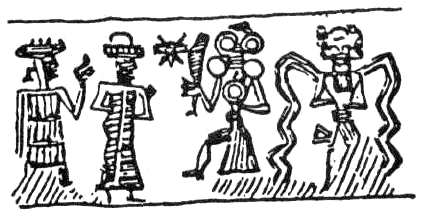
Figure 41
It shows the monster, the heroic king, Enkidu (on the
right) and a God (on the left), the latter representing Shamash
who, according to the epic tale, came at this crucial moment to the
rescue. "Down from the skies divine Shamash spoke to them,"
revealing a weakness in Huwawa’s armor and devising a strategy for
the comrades’ attack. Huwawa, the deity explained, usually protects
himself with "seven cloaks," but now "only one he had donned, six
are still off."
They could therefore slay Huwawa with the weapons
they had, if only they could approach him closely enough; and to
make that possible, Shamash said, he would create a whirlwind that
"would beat against the eyes of Huwawa" and neutralize his
death-beam.
Soon the ground began to shake; "white clouds grew black." "Shamash
summoned up great tempests against Huwawa" from all directions,
creating a massive whirlwind. " Huwawa’s face grew dark; he could
not charge forward, nor could he move backward." The two then
attacked the incapacitated monster. "Enkidu struck the guardian, Huwawa, to the ground. For two leagues the cedars resounded" with
the monster’s fall.
Wounded but not dead, Huwawa spoke up, wondering
why he had not slain Enkidu as soon as he had discovered his
entering the forest. Turning to Gilgamesh, Huwawa offered him all
the wood he wished from the luxuriant cedars - undoubtedly a most
precious prize.
But Enkidu urged Gilgamesh not to listen to the
enticements.
"Finish him off, slay him!" he shouted to Gilgamesh.
"Do it before the leader Enlil hears it in Nippur!"
And seeing
Gilgamesh hesitate, "Enkidu Huwawa put to death."
"Lest the Gods be filled with fury at them," and as a way to "set up
an eternal memorial,"
the comrades cut down one of the cedar trees,
made poles of it, and formed of them a raft with a cabin on it.
In
the cabin they put the head of Huwawa,
and pushed the raft down a
stream.
"Let the Euphrates carry it to Nippur," they said.
And thus rid of the monstrous guardian of the path to the Landing
Place, the two stopped to rest at the stream. Gilgamesh "washed his
filthy hair, he cleaned his gear, shook his locks over his back,
threw away his dirty clothes, put on fresh ones. He clothed himself
in robes and tied on a sash." There was no need to rush; the way to
the "secret abode of the Anunnaki" was no longer blocked.
He totally forgot that the place was also "the crossroads of Ishtar."
Using the Landing Place for her sky-roaming, Ishtar was watching
Gilgamesh from her skychamber (Fig. 42). Whether or not she had
witnessed the battle with Huwawa is not reported. But she was
certainly watching Gilgamesh take off his clothes, bathe and groom
himself, clothe himself in fine robes. And "glorious Ishtar raised
an eye at the beauty of Gilgamesh." Wasting no time, she directly
addressed Gilgamesh: "Come, Gilgamesh, be thou my lover! Grant me
the fruit of thy love!"
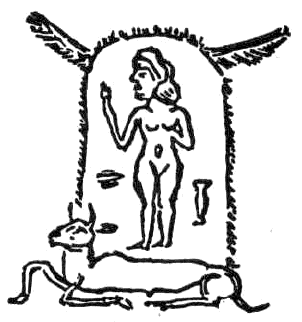
Figure 42
If he were to become her lover, Ishtar promised, kings, princes, and
nobles would bow to him; he shall be given a chariot adorned with
lapis and gold; his flocks would double and quadruple; the produce
of field and mountain shall be his fill ... But, to her surprise,
Gilgamesh turned down her invitation. Listing only the few worldly
possessions that he could offer her, he foresaw her quick tiring of
him and his lovemaking. Sooner or later, he said, she would get rid
of him as of "a shoe that pinches the foot of its owner."
I will obtain for you eternal life, Ishtar announced. But that, too,
could not convince Gilgamesh. Listing all her known lovers, whom she
used and discarded, "which of your lovers lasted forever?" Gilgamesh
asked, "which of your masterful paramours went to heaven?" And, he
concluded, "if you will love me, you shall treat me just like them."
"When Ishtar heard this, Ishtar was enraged, and to the skies flew
off.’" In her fury at being rejected, she appealed to Anu to punish
Gilgamesh, who "had disgraced me." She asked Anu for the Bull of
Heaven so that it might smite Gilgamesh. At first Anu refused, but
in the end he yielded to the pleas and threats of Ishtar, and "put
the reins of the Bull of Heaven in her hands."
(GUD.ANNA, the Sumerian term employed in the ancient texts, is
commonly translated "Bull of Heaven," but it could also be
understood to more literally mean the "Bull of Anu." The term was
also the Sumerian name for the celestial constellation of the Bull
(Taurus), which was associated with Enlil. The "Bull of Heaven" that
was kept in the Cedar Forest guarded by Enlil’s monster could have
been a specially selected bull, or the "prototype" bull seeded from
Nibiru to create bulls on Earth. Its counterpart in Egypt was the
sacred Apis Bull.)
Attacked by the Bull of Heaven, the comrades forgot all about the
Landing Place and the search for Immortality, and fled for their
lives. Aided by Shamash, the "distance of a month and fifteen days
in three days they traversed." Arriving in Uruk, Gilgamesh sought
protection behind its ramparts while Enkidu waited outside, to face
the attacker.
Hundreds of the city’s warriors came out too; but the
snorts of the Bull of Heaven opened up pits in the earth into which
the warriors
fell. Seeing an opportunity when the sky monster turned, Enkidu
leapt on its back and seized it by the horns. With all us might and
whipping its tail, the Bull of Heaven fought Enkidu off. Desperate,
Enkidu called out to Gilgamesh: Plunge your sword in, between the
base of the horns and the neck tendons!
It was a call that has echoed in bullfighting arenas to this very
day ...
In this first-ever recorded bullfight,
"Enkidu seized the Bull of
Heaven by us thick tail and spun it around. Then Gilgamesh like a
butcher, between neck and horns thrust his sword. The heavenly
creature was defeated, and Gilgamesh ordered celebrations in Uruk.
But "Ishtar, in her abode, set up a wailing; she arranged a weeping
over the Bull of Heaven"
Among the numerous cylinder seals that have been unearthed
throughout the Near East that depict scenes from the Epic of
Gilgamesh, one (found in a Hittite trading outpost on the
border with Assyria, Fig. 43) shows Ishtar addressing Gilgamesh with
the seminaked Enkidu watching; in the space between the Goddess and
Gilgamesh the severed head of Hu-wawa as well as that of the Bull of
Heaven, are shown.
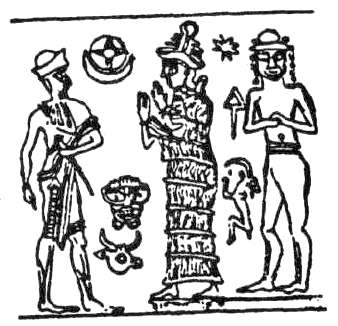
Figure 43
And so it was that while Gilgamesh was celebrating in Uruk the Gods
held a council. Ami said: "Because they have slain the Bull of
Heaven and Huwawa, the two of them must
die." Enlil said: "Enkidu shall die, let Gilgamesh not die." But
Shamash, accepting part of the blame, said: "Why should innocent
Enkidu die?"
While the Gods discussed his fate, Enkidu was struck with a coma.
Hallucinating, he envisioned being sentenced to death. But the final
decision was to commute his death sentence to hard labor in the
"Land of Mines," a place where copper and turquoise were obtained by
backbreaking toil in dark tunnels.
Here the saga, already filled with more dramatic and unexpected
twists and turns than the best of thrillers, took yet another
unforeseen turn. The "Land of Mines" was located in the Fourth
Region, the Sinai peninsula; and it dawned on Gilgamesh that here
was a second chance for him to join the Gods and attain immortality,
for the "Land of Living" - the Spaceport where the Shem rocketships
were based, commanded by Shamash - was also diere, in the Fourth
Region.
So, if Shamash could arrange for him to accompany Enkidu, he
(Gilgamesh) would reach the Land of Living! Seeing this unique
opportunity, Gilgamesh appealed to Shamash:
O Shamash,
The Land I wish to enter;
he thou my ally!
The Land which with the cool cedars is aligned,
I wish to enter; be thou my ally!
In the places where the Shems have been raised,
Let me set up my
Shem/
When Shamash responded by describing to Gilgamesh the hazards and
difficulties of the land route, Gilgamesh had a bright idea: He and
Enkidu would sail there by boat! A Magan boat - a "ship of Egypt" - was
outfitted. And, accompanied by fifty heroes as sailors and
protectors, the two comrades sailed away. The route, by all
indications, was down the Persian Gulf, around the Arabian
peninsula, and up the Red Sea until the Sinai coast was to be
reached. But the planned voyage was not to be.
When Enlil demanded that "Enkidu shall die," and the death sentence
was commuted to hard labor in the Land of
Mines, it was decreed by the Gods that two emissaries, "domed like
birds, with wings for garments," shall take Enkidu by the hand and
carry him thereto (Fig. 44a). The sea voyage contradicted that, and
the wrath of Enlil was yet to come. Now, as the ship sailed close to
the Arabian coast and the sun was setting, those on board could see
someone - "if a man he be, or a God he be" - standing on a mound "like
a bull," equipped with a ray-emitting device (Fig. 44b).

Figures 44a and 44b
As if by an
unseen hand, the "three ply cloth" that was the ship’s sail suddenly
tore apart. Next, the ship itself was thrust on its side and
capsized. It sank fast, like a stone in water, and all aboard with
it, except Gilgamesh and Enkidu. As Gilgamesh swam out of the ship
and up, dragging Enkidu along, he could see the others seated where
they were, "as though living creatures." In the sudden death, they
just froze in whatever position they were.
The two sole survivors reached the shore and spent the night on an
unknown coast discussing what to do. Gilgamesh was undeterred in his
desire to reach the Land of Living; Enkidu advised that they seek
the way back to Uruk. But the the was already cast for Enkidu; his
limbs became numb, his insides were disintegrating. Gilgamesh
exhorted his comrade to hold on to life, but to no avail.
For six days and seven nights Gilgamesh mourned Enkidu; then he
walked away, roaming the wilderness aimlessly, wondering not when
but how he too shall die: "When I die, shall I not be like Enkidu?"
Little did he know that after all the previous adventures, after the
diverse Divine Encounters, after the dreams and
visions, the real and the imagined, the fights and the flights, and
now all alone - that only now his most memorable saga was about to
begin.
How long Gilgamesh roamed aimlessly in the wilderness, the ancient
epic does not tell. He trod unbeaten paths encountering no man,
hunting for food. "What mountains he had climbed, what streams he
had crossed, no man can know," the ancient scribes noted. Finally he
took hold of himself. "Must I lay my head inside the earth and sleep
through all the years?" he asked himself, and join his comrade in
death, or would the Gods "let mine eyes behold the sun?" Again he
was filled with determination to avoid a mortal’s fate by reaching
the Land of Living.
Guided by the rising and setting sun - the celestial counterpart of
Shamash - Gilgamesh trekked in a purposeful manner. As day followed
day, the terrain began to change: the flat desert wilderness, home
of lizards and scorpions, was ending and he could see mountains in
the distance. The wildlife was also changing. "When at night he
arrived at the mountain pass, Gilgamesh saw lions and grew afraid."
He lifted his head to Sin and prayed: "To the place where the Gods
rejuvenate my steps are directed ... Preserve thou me!"
The change from Shamash to Sin (the father of Shamash) as the
protecting deity to whom the prayer is addressed is made in the text
without pause or comment; and we are left to presume that somehow
Gilgamesh had realized that he had reached a region dedicated to
Sin.
Gilgamesh "went to sleep and awoke from a dream," in which he saw
himself "rejoice with life." He took it as a favorable omen from Sin, that he would manage to cross the mountain pass despite the
lions roaming there. Gathering his weapons, "Gilgamesh like an arrow
descended among the lions," striking the beasts with all his
strength: "He smote them, he hacked away at them." But by midday his
weapons shattered and Gilgamesh threw them away. Two lions were
still left facing him; and Gilgamesh now had to fight them with his
bare hands.
The fight with the lions, in which Gilgamesh was the victor, was
commemorated by artists throughout the ancient Near East, and not
only in Mesopotamia (Fig. 45a). It was depicted by the Hittites
(Fig. 45b) to the north, the Cassites in Luristan to the east (Fig.
45c), even in ancient Egypt (Fig. 45d). In later times such a
feat - vanquishing lions with bare hands - was attributed in the Bible
only to Samson, he of the God-given superhuman power (Judges
14:5-6).
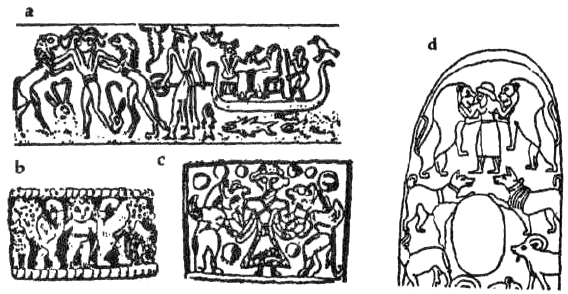
Fig. 45a, b, c, d
Clad in the skin of one of the lions, Gilgamesh traversed the
mountain pass. In the distance he saw a body of water, like a vast
lake. In the plain beyond the inland sea he could see a city
"closed-up about," a city surrounded by a fortified wall. It was,
the epic text explains, a city where "the temple to Sin was
dedicated." Outside the city, "down by the low-lying sea," Gilgamesh
could see an inn.
As he approached the inn, he could see inside
"Siduri, the ale-woman." There were vat stands, fermentation vats,
inside; and the ale-woman, Siduri, was holding a jug of ale and a
bowl of yellow porridge. Gilgamesh paced around, seeking a way to
enter; but Siduri, seeing an unkempt man wearing a lion’s skin, "his
belly shrunk, his face like that of a wayfarer from afar," was
frightened and bolted the door. With great difficulty Gilgamesh
managed to convince her of his true identity.
Fed and rested, Gilgamesh told Siduri all about his adventures, from the first journey to the Cedar Forest, the slaying of
Huwawa and of the Bull of Heaven, the second voyage and the death of
Enkidu, followed by his wanderings and the slaying of the lions. His
destination, he explained, was the Land of Living; Immortality could
be attained there, for Utnapishtim of Deluge fame was still living
there. What is the way to the Land of Living? Gilgamesh asked
Siduri. Must he go the long and hazardous way around the sea, or
could he sail across it? "Now, ale-woman, which is the way to
Utnapishtim? Give me the directions!"
Crossing the sea, the ale-woman answered, was not possible, for its
waters are "the Waters of Death:"
Never, Gilgamesh, has there been a crossing;
From days of long ago,
no one arrived from across the sea.
Valiant Shamash did cross the sea,
but other than Shamash, who can cross it?
As Gilgamesh fell silent, Siduri revealed to him that there could be
a way, after all, to cross the Waters of Death: Utnapishtim has a
boatman; his name is Urshanabi. Urshanabi can cross the Waters of
Death because "with him are the Stone Things." He comes across to
pick up Urnu (meaning unclear) in the woods. Go and wait for him,
Siduri said to Gilgamesh, "let him see your face." If it suits him,
he will take you across. So advised, Gilgamesh went to the shore to
await the boatman Urshanabi.
When Urshanabi saw him, he wondered who Gilgamesh was, and Gilgamesh
told him the long story. Convinced of the true identity of Gilgamesh
and his legitimate wish to reach the Land of Living, Urshanabi took
Gilgamesh aboard. But no sooner than this was done, Urshanabi
accused Gilgamesh of smashing the "Stone Things" required for the
crossing. Reprimanding Gilgamesh, Urshanabi told him to go back to
the forest, cut to shape 120 poles; and use up the poles in groups
of twelve as they sailed across. After three days, they reached the
other side.
Where shall I go now? Gilgamesh asked Urshanabi. Urshanabi told him
to go straight ahead until he reached "a regular
way" that leads toward "the Great Sea." He was to follow that road
until he reached two stone columns that serve as markers. Turning
there, he would come to a town named (in the Hittite recension of
the epic) Itla, sacred to the God Ullu-Yah. That God’s permission was
needed in order to cross into the Forbidden Region where Mount Mashu
was; that, Urshanabi said, is your destination.
Itla proved a mixed blessing for Gilgamesh. Arriving there he ate
and drank, washed and changed to proper attire. On the advice of
Shamash, he offered sacrifices to UIlu-Yah (meaning, perhaps, "He of
the Peaks"). But the Great God, learning of the king’s wish for a
Shem, vetoed the idea. Seeking the intercession of Shamash,
Gilgamesh then pleaded with the Gods for an alternative: "Let me
take the road to Utnapishtim, the son of Ubar-Tutu!"
And that, after
some deliberation, was permitted.
After a journey of six days, Gilgamesh could see the sacred mountain
of which Urshanabi the boatman had spoken:
The name of the mountain is Mashu.
At the mountain of Mashu he arrived,
where daily the Shems he watched
as they depart and come in.
On high, to the Celestial Band it is connected;
below, to the Lower World it is hound.
There was a way to go inside the mountain, but the entrance was
guarded by awesome "Rocket-men:"
Rocket-men guard its gate.
Their terror is awesome, their glance is death.
Their dreaded spotlight sweeps the mountains.
They watch over Shamash as he ascends and descends.
Caught in the sweep of the deadly spotlight, Gilgamesh shielded his
face; unharmed, he paced toward the Rocket-men (a scene depicted on
a cylinder seal might have illustrated this episode - Fig. 46). They
were astounded to see that the death rays did not affect Gilgamesh,
and realized that "he who comes, the flesh of the Gods is his body."
Allowed to approach, they questioned Gilgamesh; and he told them who he was and
that he was indeed two-thirds divine.
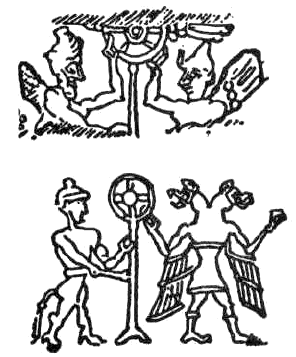
Figure 46
"On account of Utnapishtim, my
forefather, have I come," he told the guards,
"he who the
congregation of the Gods has joined; about Death and Life I wish to
ask him."
"No mortal has passed through the mountain’s inaccessible tract!"
the guards told Gilgamesh.
However, recognizing that he was not a
mere mortal, they let him through.
"The gate of the Mount is open to
thee!" they announced.
The "inaccessible tract" was a subterranean "path of Shamash." The
passage through it lasted twelve double-hours. "The darkness was
dense, there was no light." Gilgamesh could not see "ahead or
behind." In the eighth double-hour something made him scream with
fear. In the ninth double-hour "he felt a north wind fanning his
face" - he was Hearing an opening to the sky. In the eleventh
double-hour he could see dawn breaking. Finally, in the twelfth
double-hour, "it had grown bright; he came out in front of the sun."
Out of the subterranean passage through the sacred mountain, in
sunlight, Gilgamesh came upon an incredible sight. He saw "an
enclosure of the Gods" wherein there was a garden; but the "garden"
was made up entirely of artificially carved precious stones:
"All
kinds of thorny Prickly Bushes
were visible, blooming with gemstones; Carnelian bore fruit hanging
in clusters, its vines too beautiful to behold. The foliage was of
lapis lazuli; and grapes, too lush to look at, of ... stones were
made."
The partly damaged verses go on to list
other kinds of fruit-bearing trees and the variety of precious
stones - white and red and green - of which they were made. Pure
water ran through the garden, and in its midst he saw "like a Tree
of Life and a Tree of ... that of Angug stones were made."
Enthralled and amazed. Gilgamesh walked about the garden. Clearly,
he found himself in a simulated Garden of Eden!
Unbeknown to him, he was being watched by Utnapishtim.
"Utnapishtim
was looking from a distance, pondered and spoke to himself, took
counsel with himself:" who is this man and how did he show up here?
he wondered; "he who comes here is not one of my men" - no one who has
been with him on the ark ...
As he approached Gilgamesh, Gilgamesh was astounded: the hero of the
Deluge from thousands of years ago was not at all older than he,
Gilgamesh, was!
"He said to him, to Utnapishtim, the Far-Distant: As
I look upon thee, Utnapishtim, thou art no different at all; even
as I art thou!"
But who are you, why and how did you get here? Utnapishtim wanted to
know. And, as he had done with Siduri and the boatman, Gilgamesh
related the whole story of his Kingship, ancestry, comradeship with
Enkidu, and the adventures in search of Immortality, including the
latest ones. "So I thought of going to see Utnapishtim, the
Far-Distant, of whom people speak," Gilgamesh concluded. Now, he
told Utnapishtim, tell me the secret of your Immortality! Tell me
"how you came to join the congregation of the Gods, and attained
eternal life?"
Utnapishtim spoke to him, to Gilgamesh: I will reveal to thee,
Gilgamesh, a hidden matter, a secret of the Gods I will tell thee.
And then followed the story of the Deluge reported in the first
person by Utnapishtim, in all its details from beginning
to end, until Enlil, on the Mount of Salvation where the ark came to
rest,
"holding me by the hand, took me aboard the ship; he took my
wife aboard and made her kneel by my side. Standing between us, he
touched our foreheads to bless us. Hitherto Utnapishtim has been
mortal (Enlil said), henceforth Utnapishtim and his wife shall be as
we Gods are; Utnapishtim shall reside far away, at the mouth of the
rivers. Thus they took me and made me reside far away, at the mouth
of the rivers."
That, Unapishtim concluded, is the whole truth about his escaping a
mortal’s fate.
"But now, who will for thy sake call the Gods to
Assembly, that the Life which thou seekest thou mayest find?"
Realizing that only a decree of the Gods meeting in Assembly could
give him Immortality, and not his own searches, Gilgamesh passed
out; for a week he lay unconscious. When he came to, Utnapishtim
called upon Urshanabi the boatman to take Gilgamesh back, "that he
may return safe on the way by which he came."
But as Gilgamesh was
ready to depart, Utnapishtim, pitying him, decided to disclose to
him yet another secret: Everlasting life is attained not by being
immortal - it is attained by staying forever young!
Utnapishtim said to him, to Gilgamesh:
Thou hast come hither, toiling and straining.
What shall I give thee to take back to your land?
Let me disclose, Gilgamesh,
a closely-guarded hidden matter -
a secret of the Gods I will tell thee:
A plant there is,
like a prickly berrybush is its root.
Its thorns are like a brier-vine’s;
thine hands the thorns will prick.
[But] if with thine own hands the plant
you could obtain,
Rejuvenation you will find.
The plant grew underwater, perhaps in the well or spring in the
splendid garden. Some kind of a pipe led to the source or depths of
these Waters of Life. No sooner did Gilgamesh hear the secret, than
he "opened the water-pipe, tied heavy
stones to his feet; they dragged him down to the abyss." And there
he saw the plant.
He took the plant himself
though it pricked his hands.
He cut the heavy stones from his feet;
the second one cast him back
to where he had come from.
Urshanabi, who had been summoned by Utnapishtim, was waiting for
him. Triumphant and exhilarated, Gilgamesh showed him the Plant of
Rejuvenation. Overcome with excitement, he said to the boatman:
Urshanabi,
This plant of all plants is unique:
By it a man can regain the breath of life!
I will take it to ramparted Uruk,
there the plant to cut and eat.
Let its name be called
"Man becomes young in old age."
Of this plant I shall eat
and to my youthful state shall I return.
With these high hopes for rejuvenation the two started on the way
back.
"At thirty leagues they stopped for the night. Gilgamesh saw a
well whose water was cool. He went down into it to bathe in the
water. A snake smelt the fragrance of the plant; it came up silently
and carried off the plant. As it took it away, the snake shed its
scaly skin."
It was indeed a rejuvenating plant; but it was the
snake, not Gilgamesh, who ended up rejuvenated ...
Thereupon Gilgamesh sits down and weeps,
his tears running down his face.
He took the hand of Urshanabi the boatman.
"For whom" (he asked) "have my hands toiled?
For whom is spent the blood of my heart?
For myself I have not obtained a boon;
For a snake the boon I affected."
Brooding over his misfortune, Gilgamesh recalled an incident during
his dive for the plant "which must have been an omen." "While I was
opening the pipe, arranging the gear," he told Urshanabi, "I found a
door seal; it must have been placed as an omen for me - a sign to
withdraw, to give up." Now Gilgamesh realized that he was not fated
to obtain the Plant of Rejuvenation; and having plucked it out of
its waters, he was fated to lose it.
When he finally returned to ramparted Uruk, Gilgamesh sat down and
had the scribes write down his odyssey. "Let me make known to the
country him who the Tunnel had seen; of him who knows the waters let
me the full story tell." And it was with those introductory words
that the Epic of Gilgamesh was recorded, to be read, translated,
rewritten, illustrated, and read again for generations
thereafter - for all to know that Man, even if two-thirds divine,
cannot change his fate.
The Epic of Gilgamesh is replete with geographical markers that
enhance its authenticity and identify the targets of that ancient
search for Immortality.
The first destination was the Landing Place in the Cedar Forest, in
the Cedar Mountains. There was only one such place in the whole of
the ancient Near East, renowned for its unique cedars: Lebanon
(whose national emblem, to this very day, is the cedar tree).
Lebanon is specifically mentioned by name as the land the two
comrades reached after the journey of seventeen days from Uruk.
In
another verse, describing how the earth shook as the skyrocket was
launched, the facing peaks "Sirara and Lebanon" are described as
"splitting apart." In the Bible (Psalms 27) the majestic Voice of
the Lord is described as "breaking the cedars of Lebanon" and making
"Lebanon and Sirion skip like a calf." There is no doubt that Sirion
is Hebrew for Sirara in the Mesopotamian text.
There is also no doubt that a Landing Place had existed mere, for
the simple reason that that vast platform is still there to this
very day. Located at a place nowadays called
Baalbek, the immense
stone platform, some five million square feet in area, rests upon
massive stone blocks that
weigh hundreds of tons; three stone blocks, weighing more than one
thousand tons each and known as the Trilithons (Fig. 47), were
quarried in a valley miles away, where one of the colossal stones
still sticks out of the ground, its quarrying not having been
completed (Fig. 48).
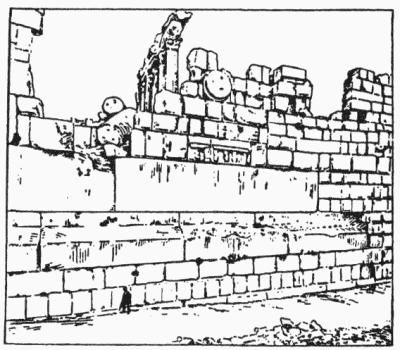
Figure 47
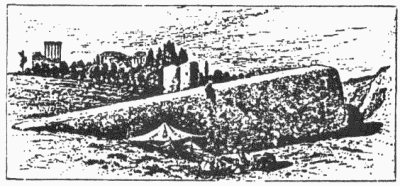
Figure 48
There is no modern equipment that can lift
such weight; yet in bygone days
"someone" - local lore says "the giants" - quarried, lifted, and
emplaced these stone blocks with great precision.
Greeks and Romans followed Canaanites and others before them in
deeming the platform a sacred site, on which to build and rebuild
temples to the great Gods. We have no picture of what had stood
there in the days of Gilgamesh; but we do know what had been there
afterward, in Phoenician times. We know, because the platform, with
an enclosure, held a skyrocket poised upon a crossbeamed pedestal - as
depicted on a coin from Byblos (Fig. 49).
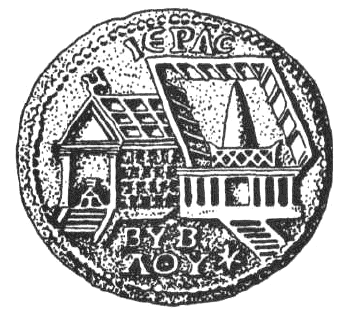
Figure 49
The most telling geographical detail in the second journey of
Gilgamesh is the body of water he had reached after crossing the
wilderness. It is described as a "low-lying sea," a sea that looked
like "a vast lake." It was called the sea of the "Waters of Death."
These are all identifying features of the landlocked sea that is
still called the Dead Sea, which is indeed the lowest-lying sea in
the world.
In the distance Gilgamesh could see a city that was "closed-up
about," a city surrounded by a wall, whose temple was dedicated to
Sin. Such a city - one of the oldest in me worlds - is still there; it
is known as Jericho, which in Hebrew (Yeriho) means "City of me Moon God," who indeed was
Sin; the city was famous for its walls, whose
miraculous toppling is recounted in the Bible. (One must also
wonder to what extent the biblical tale of the spies of Joshua
who hid in the inn of Rahab in Jericho, reflects the brief stay of
Gilgamesh at Siduri’s inn).
Having crossed the Sea of Death, Gilgamesh followed a way that led
"toward the Great Sea." This term too is found in the Bible (e.g.
Numbers. 34, Joshua 1) and indisputably referred to the
Mediterranean Sea. Gilgamesh, however, stopped short of going all
the way and instead stopped at the town called Itla in the Hittite
recension. Based on archaeological discoveries and the biblical
narrative of the Exodus, Itla was the same place that the bible
called Kadesh-Barnea; it was an ancient caravan town situated at the
border of the restricted Fourth Region in the Sinai peninsula.
One can only speculate whether the mountain to which Gilgamesh was
directed. Mount Mashu, bore a name that is almost identical to the
Hebrew name of Moses, Moshe. The subterranean journey of Gilgamesh
inside this sacred mountain, lasting twelve double-hours, is
clearly paralleled by the description in the Egyptian Book of the
Dead of the Pharaoh’s subterranean journey through twelve
hour-zones.
The Pharaohs, like Gilgamesh, asked for a
Shem - a rocketship - with which to ascend heavenward and join the Gods in an
eternal abode. Like Gilgamesh before them, the Pharaohs had to cross
a body of water and be assisted by a Divine Boatman. There is no
doubt that both the Sumerian king’s and Egyptian Pharaoh’s
destination was one and the same, except that they went there from
opposite starting points. The destination was the Spaceport in the
Sinai peninsula, where the Shems, in their underground silos (see
Fig. 31) were.
As in pre-Diluvial times (Fig. 25), the post-Diluvial Spaceport
(Fig. 50) was also anchored on the peaks of Ararat. But with the
plain of Mesopotamia totally covered by muddy waters, the Spaceport
was shifted to the firm ground of the Sinai peninsula.
Mission
Control Center shifted from Nippur to where Jerusalem (JM) is now
located.
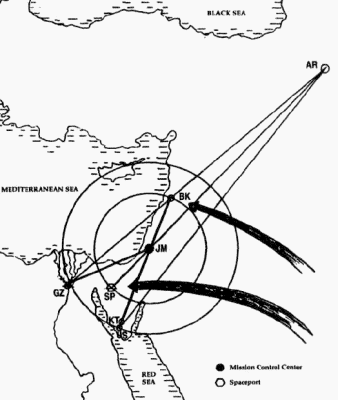
Figure 50
The new landing corridor, anchored at its end on two
artificial mountains that are still standing as the two great
pyramids of Giza (GZ) and the high peaks in southern Sinai (KT and
US), incorporated the immense pre-Diluvial platform of Baalbek in
the Cedar Mountains (BK).
It was to the platform at Baalbek and toward the Spaceport (SP) that
Gilgamesh had journeyed.
|
Gilgamesh in America
Familiarity with the epic tale of Gilgamesh in South America is one
facet of the evidence for prehistoric contacts between the Old and
New Worlds.
The hallmark of such familiarity was the depiction of Gilgamesh
fighting the lions. Amazingly, such depictions - in a continent that
has no lions - have been found in the lands of the Andes.
One concentration of such depictions on stone tablets ("A" and "B"
below) has been found in the Chavin de Huantar/Aija area in northern
Peru, a major gold-producing area in prehistoric times, where other
evidence (statuettes, carvings, petroglyphs) indicates the presence
of Old World peoples from 2500 B.C. on; they are similar to the
Hittite depictions (Fig. 45b).
Another area where such depictions proliferated was near the
southern shores of Lake Titicaca (now in Bolivia), where a great
metalworking metropolis -
Tiahuanacu - had once flourished. Begun by
some accounts well before 4000 B.C. as a gold-processing center, and
becoming after 2500 B.C. the world’s foremost source of tin.
Tiahuanacu was the place where bronze appeared in South America.
Among the artifacts discovered there were depictions, in bronze, of
Gilgamesh wrestling with lionlike animals ("C" below) - artwork
undoubtedly inspired by the Cassite bronzemakers of Luristan (Fig.
45c above).
 |
Back
to Contents
|












